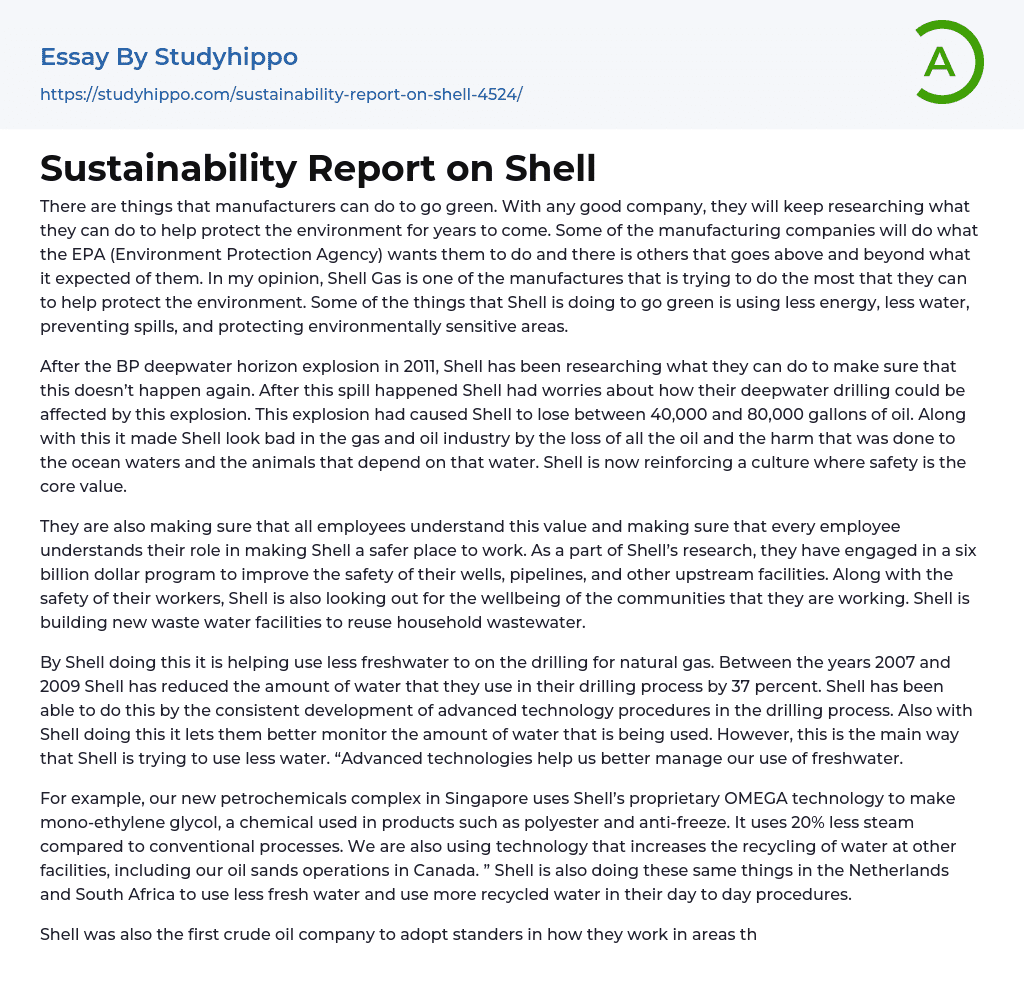Manufacturers have the ability to adopt eco-friendly practices. Responsible companies continually research ways to preserve the environment for future generations. While some manufacturing companies comply with the EPA's guidelines, there are those that surpass expectations. In my view, Shell Gas is at the forefront of environmental conservation efforts. Shell actively reduces energy and water consumption, prevents spills, and safeguards environmentally delicate regions.
Shell has been conducting research since the BP deepwater horizon explosion in 2011 to prevent a similar incident. The explosion raised concerns for Shell regarding the impact on their deepwater drilling activities. It resulted in Shell's loss of an estimated 40,000 to 80,000 gallons of oil and negatively affected their reputation within the gas and oil industry. The damage caused to ocean waters and its dependent wildlife further contributed to this negative perception. As a respons
...e, Shell is now prioritizing safety as its fundamental value, aiming to cultivate a culture focused on safety measures.
Shell is prioritizing safety and ensuring that all employees understand their individual roles in creating a safer workplace. To support this commitment, Shell has invested six billion dollars in a research program aimed at enhancing the safety of their wells, pipelines, and other upstream facilities. Alongside safeguarding their workers, Shell is also focused on the wellbeing of the communities where they operate. They are building new wastewater facilities to recycle household wastewater, which contributes to reducing freshwater consumption during natural gas drilling. From 2007 to 2009, Shell achieved a significant decrease of 37% in water usage for drilling.
Shell has been successful in achieving this by continuously advancing their technology and procedures in the drilling process. This advancement enables them to efficientl
monitor and regulate the water consumption. Hence, these advanced technologies are instrumental in facilitating Shell's objective of reducing water usage. "Advanced technologies help us better manage our use of freshwater."
For instance, Shell's petrochemicals complex in Singapore employs their exclusive OMEGA technology to produce mono-ethylene glycol, a substance utilized in various items like polyester and anti-freeze. This facility consumes 20% less steam than traditional methods. Additionally, Shell is incorporating technologies to enhance water recycling in other establishments, such as their oil sands operations in Canada. The company is implementing similar strategies in the Netherlands and South Africa to reduce freshwater usage and increase reliance on recycled water throughout daily operations.
Shell was the pioneer in the crude oil industry to implement standards for operating in biodiverse regions. Over time, Shell has consistently incorporated measures to mitigate risk to ecosystems and the associated livelihoods. The well-being of ecosystems is crucial for providing clean water, air, and sustainable food and fuel resources to communities. Biodiversity action plans have been established at nine significant Shell facilities and pipelines located in areas of high biodiversity. Shell has extended these initiatives to Iraq, Nigeria, and South Africa.
Shell prioritizes biodiversity to produce eco-friendly natural gas and promote environmental protection. They also strive to reduce carbon emissions in oil transportation by researching biofuels sourced from ingredients like soybeans, sugar cane, corn, wheat, rapeseed, and palm oil as an alternative to drilling for oil. Consequently, Shell extracts ethanol from these materials.
Ethanol is advantageous for Shell and other gas companies to produce due to its lower carbon emissions. However, a drawback of using ethanol for biofuels is that it requires farmers to allocate land for its
cultivation, resulting in reduced crop production. Nonetheless, Shell has taken numerous measures in the 21st century to contribute towards environmental protection. The company is actively engaged in researching and developing alternative methods of oil production that have minimal impact on the environment.
- Accounting essays
- Marketing essays
- Automation essays
- Business Cycle essays
- Business Model essays
- Business Operations essays
- Business Software essays
- Corporate Social Responsibility essays
- Infrastructure essays
- Logistics essays
- Manufacturing essays
- Multinational Corporation essays
- Richard Branson essays
- Small Business essays
- Cooperative essays
- Family Business essays
- Human Resource Management essays
- Sales essays
- Market essays
- Online Shopping essays
- Selling essays
- Strategy essays
- Management essays
- Franchising essays
- Quality Assurance essays
- Business Intelligence essays
- Corporation essays
- Stock essays
- Shopping Mall essays
- Harvard Business School essays
- Harvard university essays
- Trade Union essays
- Cooperation essays
- News Media essays
- Waste essays
- Andrew Carnegie essays
- Inventory essays
- Customer Relationship Management essays
- Structure essays
- Starting a Business essays
- Accounts Receivable essays
- Auditor's Report essays
- Balance Sheet essays
- Costs essays
- Financial Audit essays
- International Financial Reporting Standards essays
- Tax essays
- Accountability essays
- Cash essays
- Principal essays




